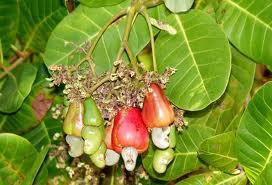A fundamental problem of the country’s cashew sector is the absence of a regulatory framework and body to manage, control and sustainably grow the sector, the Cashew Industry Association of Ghana has said.
According to the association, it is essential that a legally constituted body is established, whilst a sustainable funding mechanism is put in place, alongside a well designed and implemented long term cashew development plan.
Mr. Aaron Akyea, Executive Secretary of the association told the B&FT that demand for cashew nuts continues to rise in all major markets across the world, a reason the country needs to up its game.
Private sector actors in the industry are hopeful a draft policy which is being fine-tuned, “when fully implemented will be an opportunity and serve as a guideline for industry players and members to use the document.”
While raw nuts production in the country continues to rise through a natural rate of increase, it is not adequate to meet the 10% yearly increase in global demand for raw nuts.
But cashew production in the country is not adequate to meet the needs of processing factories across the country and for export.
A 10-year cashew master plan seeks to increase production from the estimated 70,000 metric tons obtained in 2015 to 150,000 metric tons over the next 10 years and increase access to raw cashew nuts for local processing.
The plan also seeks to intensify investments in research and development and establish nursery infrastructure to produce over five million improved planting materials for cultivation within five years.
It is further aimed at facilitating the expansion of raw cashew nuts processing from 4,400 metric tonnes to 56,000 metric tonnes by 2020 to yield about 11,000 metric tonnes of kernels to earn about US$71 million.
Unfolding development
The cashew business environment in the country has improved considerably over the last decade. Production figures have improved from 15,000 metric tonnes to about 50,000metric tonnes in 2013.
Current yield per hectre has increased to almost one metric tonnes with the demand for raw nuts continuing to grow steadily all over the world, thereby creating ready markets and improving in farm-gate prices.
Good agricultural practices for cashew, including improved planting materials, have been developed and are available to support the growth of the industry.
Installed processing capacity in the country has also increased to about 60,000mt over the last decade and continues to attract huge investments.
There are also a number of functional farmer associations, processing companies and traders linked to the industry. All these entities have triggered numerous job opportunities along the entire value chain.
Additionally, the impact of the cashew on poverty reduction and the environment in the savanna regions has been significant, with farm hands and pickers at the production levels.
Thousands of rural employment opportunities are created at the processing factories sited in the rural areas, with over 80 percent of them being woman.
The cashew industry in the country currently boasts of 13 processing companies with a total installed capacity of 65,000 metric tonnes.
There are two large ones, a medium-sized one, whilst the rest are small-sized. These companies process kernels for export, while the bulk of secondary processing takes place around Accra.
There are 21 kernel roasting companies operating in different parts of the country. Out of the number, 17 are located in the Greater Accra Region, three in the Brong-Ahafo Region and one in the Eastern Region.
The producers do not use all of the market channels available within the country effectively. As a result, products do not reach all potential points of sale, and potential buyers or sellers such as the hotels are underserved.
While cashew producers have enjoyed exceptionally high prices for their produce, reaching 79 percent of the Fright on Board value of cashew exports in 2015, the down-stream processing portion of the cashew value-chain has recently suffered.
In 2015, only one of the country’s 13 processors was operational. The critical challenge facing the survival of this industry is that of access to raw cashew nuts supplies necessary for production.
Following the closure of land-border trade in raw cashew nut from Cote d’Ivoire, fierce competition within Ghana for raw cashew nut, in particular from exporters on behalf of foreign traders, has outcompeted most local processors from the market.
Challenges facing the sector
There are however numerous but surmountable hurdles that need to be addressed for an expansion programme to be successful.
The challenges range from research to processing and marketing. These challenges constrict the expansion and profitability of the sector.
Planting materials are inferior, management of farms are generally poor, trading of raw nuts is disorganized and uncontrolled.
Most exports are originating from neighboring countries, processors are reeling from exorbitant raw cashew nut prices that have killed many plants, local consumption is low and there is limited value addition to cashew by-products such as the apples and cashew nut shell liquid, which reduces the profitability of the industry as a whole.
The gestation period for cashew is about three years and it takes five to six years to reach break-even point where it becomes a profitable venture.
Farmers, both small and large scale, are looking for suitable longer-term credit facilities. This is a challenge to local banks that shy away from the extended risks, especially in agriculture. Profitability improves with inter-cropping of food stables like maize, yams, etc.
New and more productivity planting materials and farming methods should be disseminated and made available to all cashew farmers to improve productivity.
Value addition is still limited and should be encouraged to a point where Ghana processes all its current and future raw cashew nut production. Processing is capital intensive and entrepreneurs in the sector seek suitable and adequate financing. Profitable by-products such as cashew apple and are virtually going to waste.
Social level
Even though farming and processing has a huge potential for employment creation, high processing cost has pushed the industry to consider high levels of mechanization to substitute labour.
This trajectory, however, has a trade-off – mechanization produces less whole kernels (the premium products) but the international market is adjusting to and accepting the new mechanized product mix.
Business News of Thursday, 22 September 2016
Source: B&FT
Absence of regulatory framework hampers cashew sector
 File photo
File photo
Entertainment











